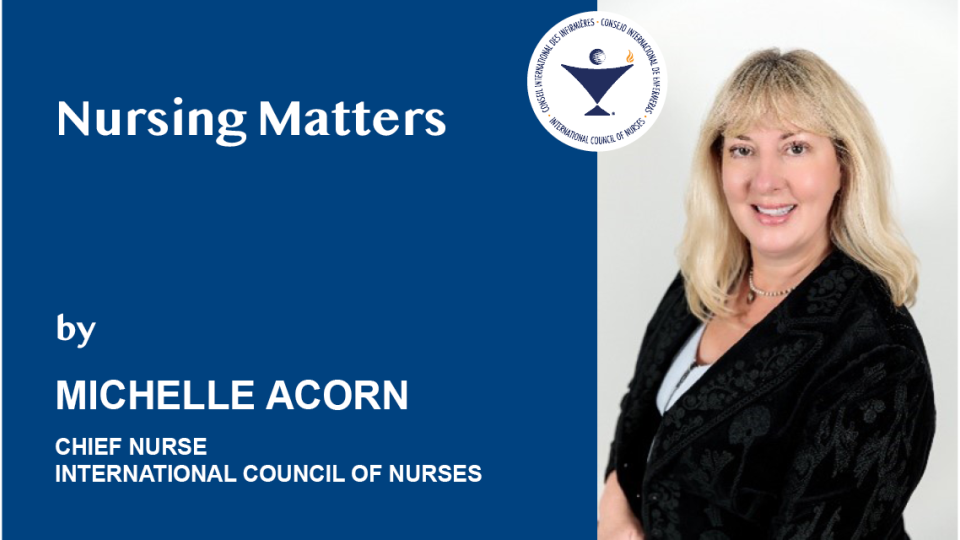Chief Nurse Blog: Nursing Matters April 2023

This month’s blog will focus on the importance of safe staffing, accountability and advocacy.
For many years ICN has been concerned about the global shortage of nurses. Its most recent (2018) position statement on Evidence- Based Safe Nurse Staffing recognises that safe nurse staffing is essential to maintain both the quality of care and the safety of patients. It states that:
“Safe nurse staffing is a critical issue for patient safety and the quality of care in hospitals, community and all settings in which care is provided. Inadequate or insufficient nurse staffing levels increase the risk of care being compromised, adverse events for patients, inferior clinical outcomes, in-patient death in hospitals and poorer patient experience of care. Having insufficient or inappropriate nursing staff to meet patient needs also results in unsustainable workloads and has a negative impact on the health and wellbeing of staff. Research suggests that investing in safe, effective and needs-based nurse staffing levels can be cost effective, promoting improvement of and preventing deterioration in patients’ health thereby reducing the duration and intensity of healthcare interventions.”
The true extent of the global shortage of nurses was only first properly quantified in the ICN/World Health Organization State of the World’s Nursing report in 2020. That report revealed a shortage of approximately six million nurses worldwide, with the most severe shortages in low and middle-income countries.
Since then, ICN’s reports have shown the lack of sufficient numbers of nurses to be a global health emergency.
The ICN Sustain and Retain in 2022 and Beyond Report (2022) highlighted the significant importance of national safe staffing levels and contained a ten-year blueprint for a better future. The increase in industrial action by nurses globally raised awareness of the issue of nursing shortages and the need for investments in the nursing workforce in an effort to address the serious safety and ethical issues the shortages caused.
The ICN Recover to Rebuild Report (2023) illustrates the extent of the global health emergency caused by the gap between increasing health demands and the insufficient supply of registered nurses. One of the four policy interventions in the report targets adequate staffing levels that are required to ensure patient safety, high quality care and the wellbeing of the nursing profession. There is no doubt that existing organisational and systems failures have caused harm to both patients and nurses.
The ICN Code of Ethics for Nurses, which was revised in 2021, provides nurses with helpful guidance about their responsibilities regarding safe staffing, including:
1.1 Nurses’ primary professional responsibility is to people requiring nursing care and services now or in the future, whether individuals, families, communities or populations.
1.2 Nurses promote an environment in which the human rights, values, customs, religious and spiritual beliefs of the individual, families and communities are acknowledged and respected by everyone. Nurses’ rights are included under human rights and should be upheld.
1.6 Nurses share with society the responsibility for initiating and supporting action to meet the health and social needs of all people.
1.7 Nurses advocate for equity and social justice in resource allocation, access to health care and other social and economic services.
1.8 Nurses demonstrate professional values such as respect, justice, responsiveness, caring, compassion, empathy, trustworthiness and integrity. They support and respect the dignity and universal rights of all people, including patients, colleagues and families.
1.9 Nurses facilitate a culture of safety in health care environments, recognising and addressing threats to people and safe care in health practices, services and settings.
However, the responsibility for ensuring that countries create, train, recruit and retain sufficient numbers of registered nurses to meet the needs of their populations, rests with their governments. Nurses can and should lobby for this to happen, and ICN will continue to advocate for safe staffing levels wherever they are needed, which is everywhere.
Just to remind you that International Nurses Day is on May 12, to commemorate the birth date of Florence Nightingale, and this year’s theme is Our Nurses, our Future. Look out for the launch of ICN’s new Charter for Change, which will help nurses everywhere to lobby for the world’s nurses to be valued, protected, respected and invested in.
I would like to express my endless gratitude and deep appreciation for your value-added services, your leadership and your commitment to advance universal health coverage and the sustainable development goals, and make sure no one is left behind.
ICN Congress is now only two months away in Montreal, Canada. I am excitedly looking forward to seeing many of you there on July 1st.
Yours in nursing and health,
Michelle
Dr. Michelle Acorn, ICN Chief Nursing Officer